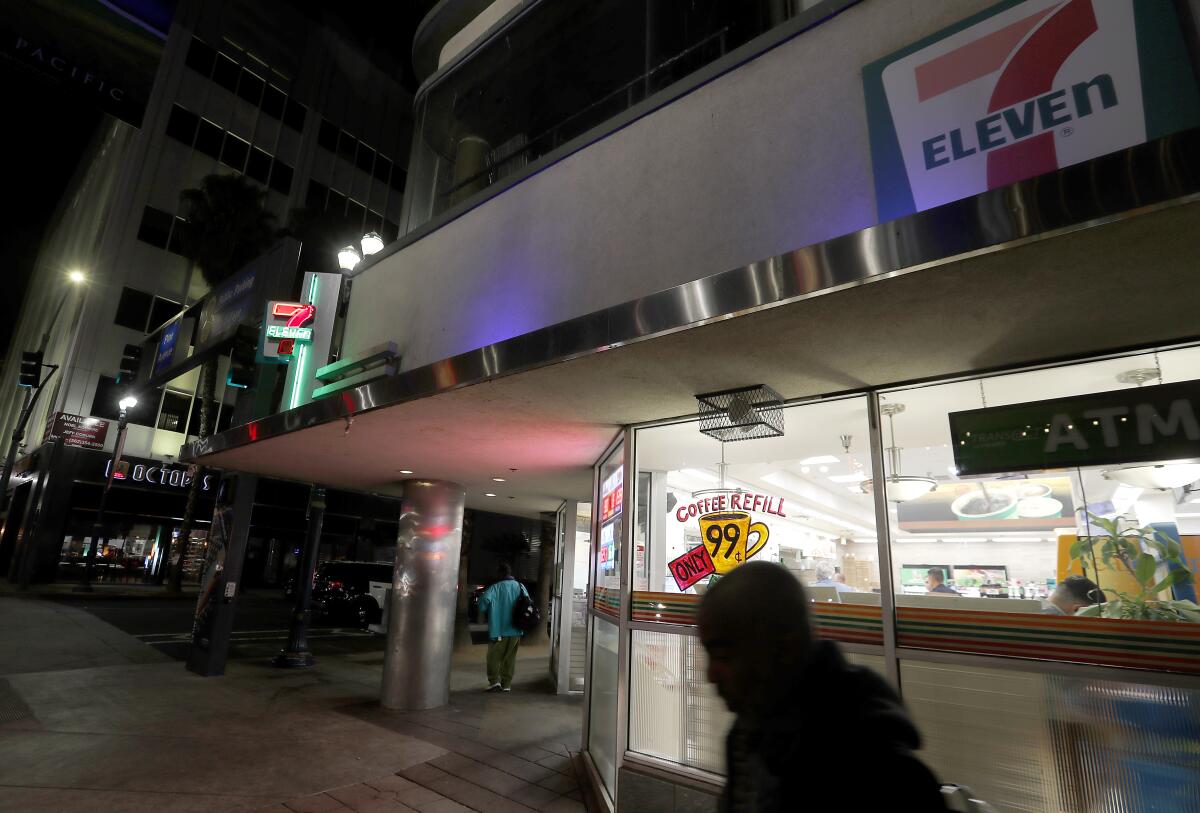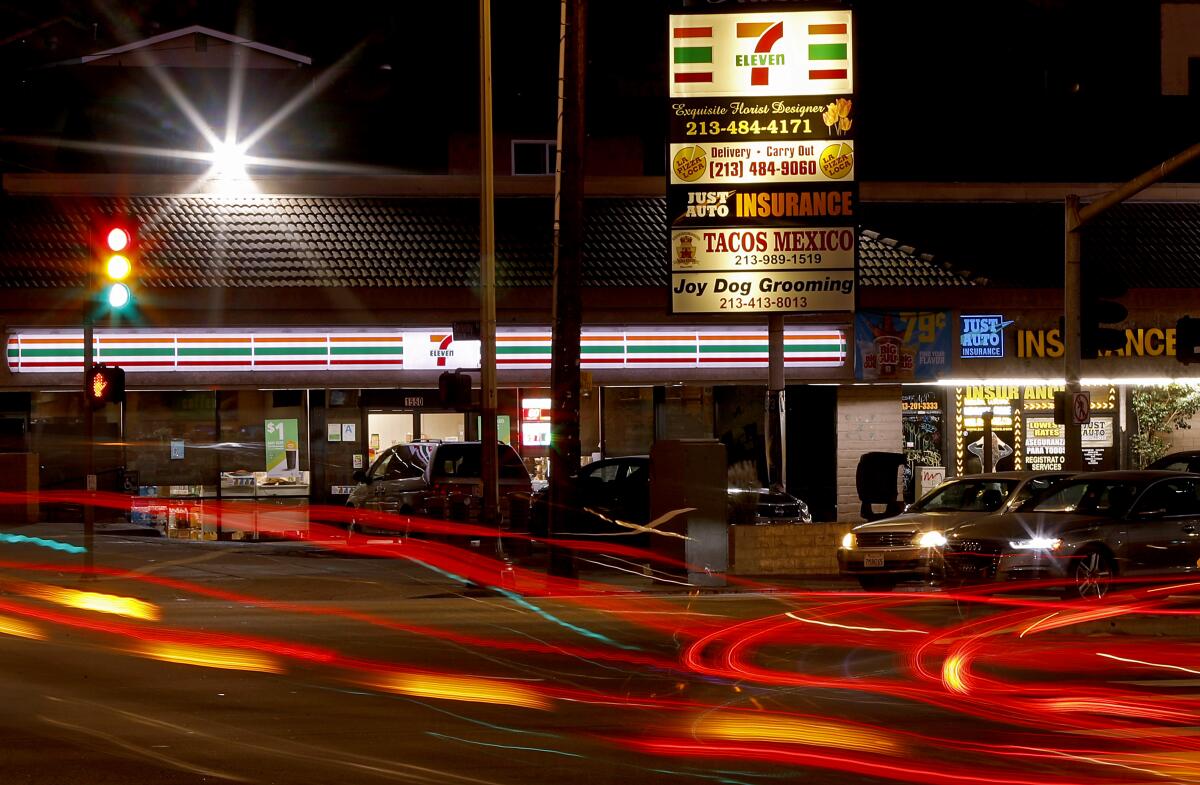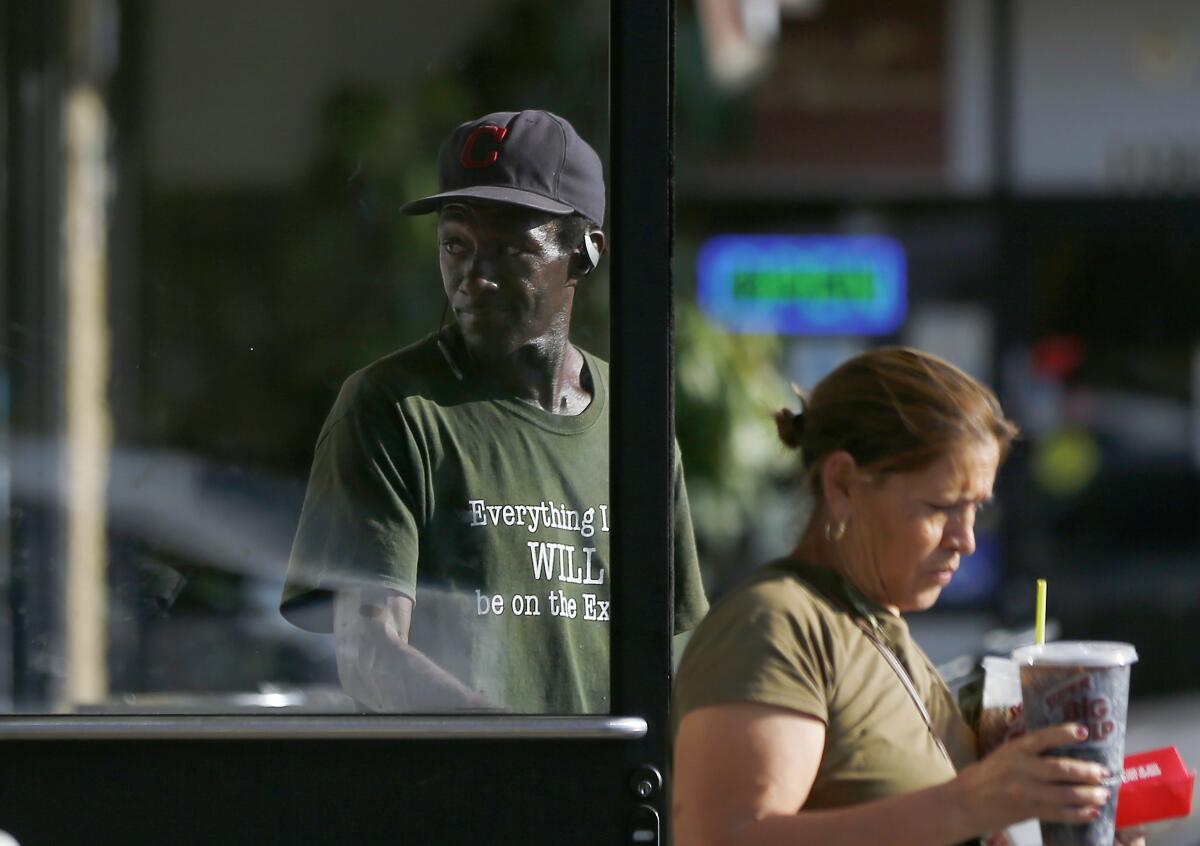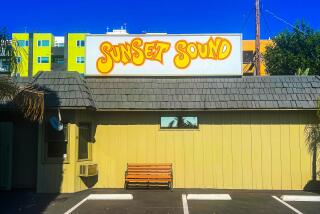To chase away homeless people, 7-Eleven stores in L.A. use classical music

The roar of traffic along Camarillo Street in North Hollywood doesn’t drown out the soaring strings of Pachelbel’s Canon in C.
The classical music continues all day and all night. It’s not coming from some stranger with a violin sitting on the street, but a set of speakers bolted below a glowing 7-Eleven sign.
“They use it as a deterrent for loitering,” said cashier Lydia Erdman, who works the night shift. The homeless people “still show up, but our customers like it better now. We had it pretty bad. It was an issue for a while.”
A regular customer chimed in on cue: “She’s terrorized every night.”
In Los Angeles, where it’s hard to go far without seeing an orange, red and green 7-Eleven sign staring down at you, the owners of multiple franchises of the convenience store have started installing speakers to play the same playlist to drive away loiterers and panhandlers, many of whom owners and managers say are homeless.

No one at 7-Eleven’s headquarters in Dallas responded to repeated requests for comment.
But the company told the Modesto Bee last year that they “test a variety of programs in our stores” and “have received very positive feedback from our customers about the atmosphere created by the music devices piloted in several 7-Eleven stores.”
The company began the program several years ago, starting with stores that “had immediate needs,” said Kathy York, president of the Franchise Owners Assn. of Greater Los Angeles. Depending on the franchise agreement for each store, the corporate arm of 7-Eleven pays for the fees associated with the construction and maintenance. But some desperate franchise owners have taken to paying for the speakers and music themselves.
The Times spoke to more than half a dozen owners and managers of the about 120 franchise locations across the city of Los Angeles. Most described how the increase of homeless people standing outside their stores has been a drag on business. Most declined to be named because they worried that speaking to the media could jeopardize their franchise agreements.
One franchise owner who had the music blaring at his 7-Eleven said the optional program was so popular that “corporate is regularly out of stock” of the equipment.
“It’s not like you can plug an iPhone into the system,” this franchise owner added. “The music comes pre-installed.”

Another owner calculated that he loses $45 every day from shoplifting — and suspects that the homeless people who come and go at his store every day are responsible. He also said he previously owned five franchises of 7-Eleven, and tested the music there, estimating that it chased away maybe 10% of those loitering outside.
“I’ve been dealing with this for over 20 years,” he said. “I don’t even know what to do about it.”
At yet another store, in Hollywood, the franchise owner said he hadn’t installed the music — yet. For now, hiring a private security guard at night has helped, along with washing the sidewalk multiple times per week.
“With the whole security thing, they’re trying,” this owner said. “There is only so much they can do.”
This use of music to clear public spaces is nothing new. Last year, 7-Eleven franchises in Modesto, Chico and Jacksonville, Fla., made headlines last year for using speakers to keep people out of their parking lots. More recently, there was outrage over the city of West Palm Beach’s use of the toddler anthem “Baby Shark” to deter homeless people living in a park.
Like planter boxes and other obstacles being installed on sidewalks and streets, the 7-Eleven playlist streaming throughout the Southland is yet another manifestation of the frustration by business owners and residents over homelessness, and the inability of government to slow the growth of it.
At times, this frustration has taken malicious forms.
Earlier this year in San Francisco, a man dumped water from a window onto a homeless woman — which sparked outrage when it was caught on video, but is an act of hatred advocates say many unhoused people face regularly.
More recently, homeless encampments in skid row and in Eagle Rock have been targets of arson. The latter incident sparked a brush fire and led to the evacuations of several homes in Eagle Rock and Glendale. It also led to the arrest of two men in their 20s, though they haven’t been charged.
Though it’s not violent, advocates say the music at 7-Eleven stores conveys a message of being unwelcoming to homeless people. It also doesn’t solve the problems on the streets and can potentially exacerbate existing tensions between the housed and unhoused communities.
“At a basic level, it’s kind of about who is entitled to public space, who is desirable and undesirable,” said Eric Tars, legal director for the National Law Center on Homelessness and Poverty. “This kind of othering of the less desirable population shows it’s OK to treat them less than you would want to be treated.”
Peter Haderlein, a customer who until recently lived near the 7-Eleven in North Hollywood — which plays the music — agreed.
“These are people. They’re not pigeons,” he said. “It’s the auditory equivalent of putting spikes on a bench, and it really bothered me.”
Haderlein said it was his interaction with a homeless man who goes by the name Majesty and holds the door for customers every day at the 7-Eleven that partially inspired him to start volunteering to help homeless people. Eventually, he also joined the North Hollywood Neighborhood Council.
Majesty, for his part, says he picks up a couple of bucks every night holding the door. He says the music doesn’t deter him, but he says others have stopped hanging around the store as much.

Another homeless man, Damien Chase, who said he has been on the streets for 25 years and, one recent evening, was standing under a cotton-candy-colored sky pulling cans from a 7-Eleven’s dumpster to recycle, said the music’s volume hurts his ears. But he said he also understands why the store, which installed the speakers four or five months ago, uses the playlist.
“I feel for store owners, having seven or eight guys standing out front of the store,” he said. “People are afraid to go in the store. I don’t blame them.”
Not far away on Santa Monica Boulevard in West Hollywood, a shirtless man sat on the curb muttering to himself as a steady stream of customers cycled in and out of the 7-Eleven. Most seemed unfazed by a rousing piece being performed by the English Chamber Orchestra.
Next door, Delìa Acuna was cleaning up after the lunch rush at Los Tacos, which has been at this location and in her family for 43 years. She said the music at the 7-Eleven started maybe two months ago and, before that, customers had regularly complained about the apparently homeless people loitering outside.
“Now it’s less than before because of the music, I think,” she said.
She has just one quibble: “I wish they played Jennifer Lopez.”
More to Read
Start your day right
Sign up for Essential California for news, features and recommendations from the L.A. Times and beyond in your inbox six days a week.
You may occasionally receive promotional content from the Los Angeles Times.






